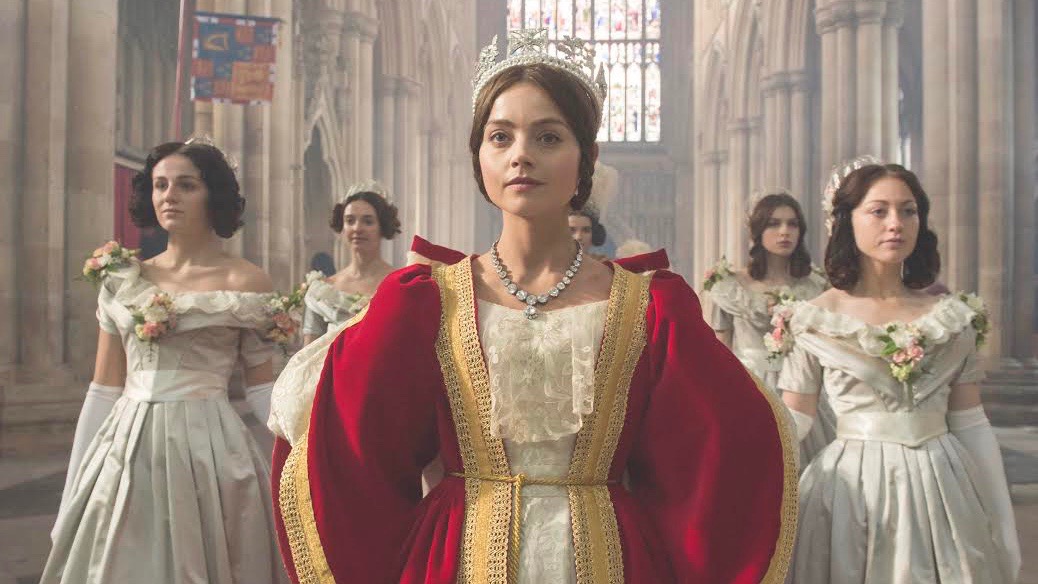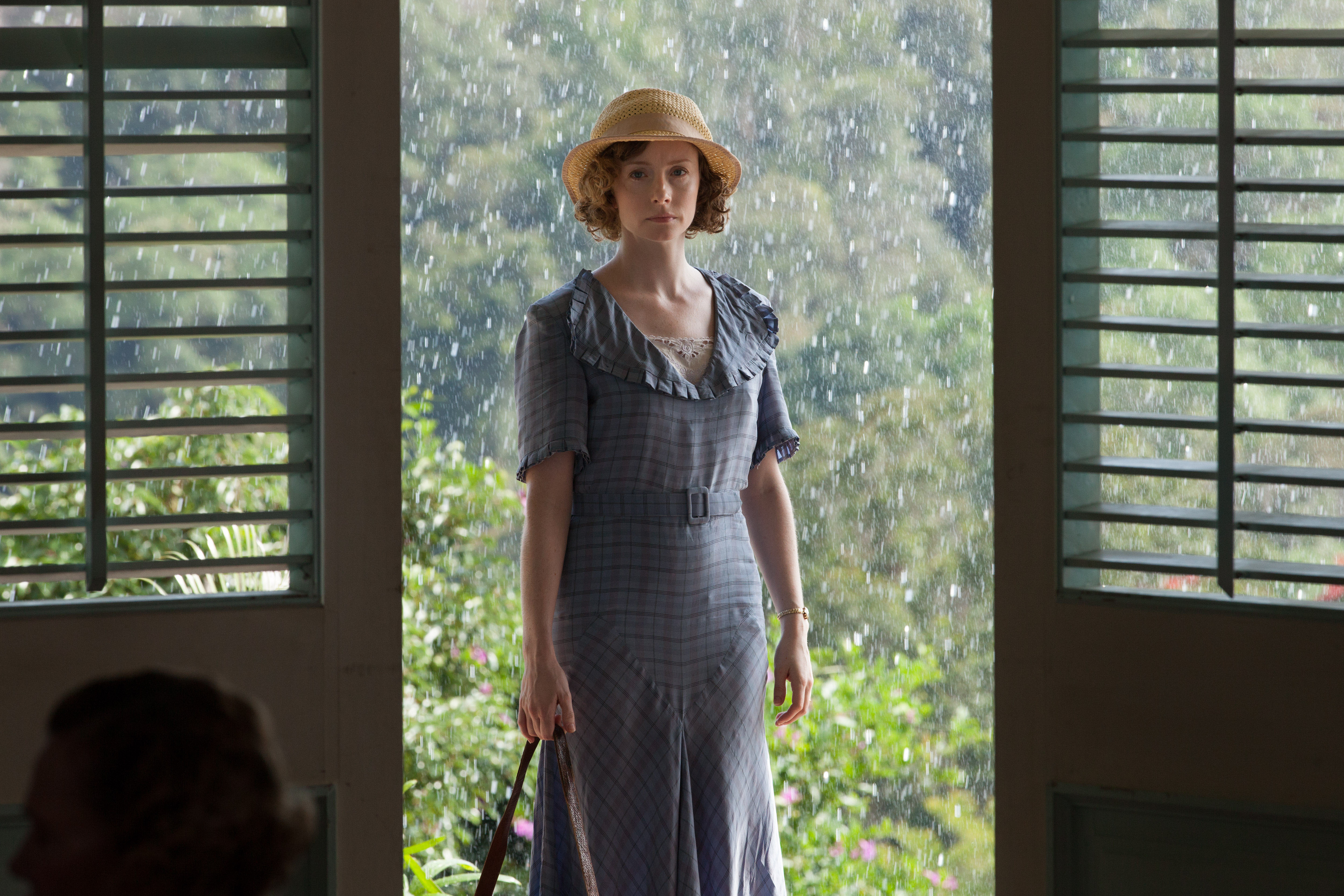New royal drama seen as ‘golden opportunity’ to build on success of ‘Downton’

ITV Plc and Masterpiece
The "Masterpiece" series "Victoria" will be available for free streams on the new Amazon Prime Video channel PBS Drama.

ITV Plc and Masterpiece
In her starring role in Victoria, Jenna Coleman conveys the young queen’s youthful naiveté and strong will. (Photos courtesy ITV Plc and Masterpiece)
On June 20, 1837, a diminutive, sheltered teenage girl awoke to learn that she had become queen of the United Kingdom and Ireland — and potentially the most powerful woman in the world.
On Jan. 15, 2017, PBS Masterpiece viewers will have the opportunity to experience the transformation of the overprotected, somewhat naïve 18-year-old Alexandrina Victoria into the strong-willed, decisive Queen Victoria in the two-hour premiere of Victoria, a seven-part Mammoth Screen (Poldark) production depicting the first three years of a reign that would continue until 1901.
The series, written by journalist, historian and bestselling novelist Daisy Goodwin (The Fortune Hunter) and starring Jenna Coleman (Doctor Who), will air in the time slot vacated by the spectacularly successful Downton Abbey, which ended its six-season PBS run last winter.
While Downton featured an ensemble cast of aristocrats and servants, Victoria fixes its gaze primarily on the young queen herself, with other figures in her life — including aristocrats and a few servants — in supporting roles. The first season mainly paints a portrait of Victoria standing up to her controlling mother; learning to navigate the scandal, corruption and political intrigues of the royal court; and, by the end, falling in love with and marrying her cousin, Prince Albert of Belgium.
“Victoria has it all: a riveting script, brilliant cast and spectacular locations,” said Masterpiece EP Rebecca Eaton, adding that the series gives a fresh view of the monarch who defined the morally rigid, straight-laced Victorian era. “When we think of Victoria, we think of a short, round lady with a little doily on her head, or a crown. It’s important to remember that she was an 18-year-old girl at the start of her reign.”
Eaton, who has headed Masterpiece for 31 years of its 45-season history, said that as Downton ended, she knew she needed to find a replacement that would appeal to its many loyal fans — an estimated 3 million to 5 million viewers who made a habit of tuning in at 9 p.m. Sundays.

Rufus Sewell co-stars with Coleman as Prime Minister Lord Melbourne, her trusted advisor and forbidden love interest.
“Downton brought so much attention and so many viewers to Masterpiece,” Eaton said. “We have an audience that is ready, willing and eager. That’s a huge opportunity.”
Victoria began airing on Britain’s ITV in August and has been renewed for a second season. For PBS viewers, Eaton said it seemed an obvious choice to keep Downton’s older core audience and appeal to millennials as well.
“It’s a very fitting program to follow Downton,” she said. “It is similar in that it has a female lead, a love story and a family saga,” but different in that it is based on historic events, she said. “It’s not revisiting Downton Abbey,” Eaton said.
“Victoria’s story is a golden opportunity for stations to bring in younger viewers,” Eaton added, explaining that one of Goodwin’s inspirations for the series was her own daughter. “Daisy looked at her 18-year-old daughter and thought, ‘Oh my God! She could become queen of England!’ … The story is every teenage girl’s dream come true and every mother’s nightmare.”
Eaton pointed out that Coleman’s popularity from her role on Doctor Who will also likely attract younger viewers, as will her fresh portrayal of the young queen.
“She has tremendous charm and gravitas,” Eaton said, explaining that Coleman is also short and small, as was the young queen, and able to convey both Victoria’s youthful naiveté and strong will. “I think she plays her perfectly.”
Other members of Victoria’s cast will attract young viewers as well, she said. Rufus Sewell (The Man in the High Castle) portrays Victoria’s father figure, friend and forbidden love interest, the British Prime Minister Lord Melbourne; Tom Hughes (Dancing on the Edge) plays the handsome, brilliant and awkward Prince Albert.
And young women in particular will identify with the teenage Victoria’s struggles to break free of the control exerted by her mother, the German-born Duchess of Kent, played by German actress Catherine Flemming, and other members of her family circle, Eaton said. Her mother’s close friend and rumored lover, Sir John Conroy, is played by Paul Rhys (Borgia); her conniving uncle, the Duke of Cumberland, is played by Peter Firth (South Riding); and her (and Albert’s) matchmaking uncle, Leopold I, King of Belgium, is played by Alex Jennings (Churchill’s Secret).
Conroy, who with Victoria’s mother enforced an elaborate and strict set of rules for Victoria’s upbringing, emerges as the series’ greatest villain and Victoria’s nemesis. Instead of submitting to their authority and accepting a regency when she became queen — as Conroy and her mother had hoped — Victoria quickly distanced herself to become free from their control.
The Duke of Cumberland, a younger brother of Victoria’s father, also had designs on the throne and is portrayed as conspiring with Conroy to discredit the young Victoria. Again, Victoria stood up for herself and refused to be manipulated.
Goodwin expanded a bit on the historical record, Eaton acknowledged, by writing Lord Melbourne as a more romantic and sympathetic character than historians have. And, she said, criticisms that Coleman, Sewell and Hughes are more physically attractive than their historical counterparts may well be accurate.
“It’s TV,” she said with a laugh.
Still, Eaton said, Goodwin’s dramatization of Victoria’s life is mostly accurate and portrays Victoria in a new way.
“Daisy Goodwin is an extraordinary talent,” she said. “She, in a way, is a combination of [Downton Abbey creator, writer and executive producer] Julian Fellowes and [Downton historical adviser] Alastair Bruce. This woman knows what she’s talking about.”
Eaton said she urges individual stations to take advantage of Goodwin’s expertise in their efforts to promote the series. PBS is providing a Q&A and podcast interview with the series creator for station websites and a written interview for program guides. PBS is also looking into making Goodwin available for local interviews, she added.
PBS and Masterpiece will provide additional opportunities to promote Victoria with more podcasts, interviews with the cast on the PBS website and public screenings of the first episode, Eaton said.
“There are 70-some stations that have already signed up for screenings,” she said, adding that stations can encourage viewers to arrive in a royal mood. “Maybe urge everyone to wear tiaras.”
According to Eaton, funding for the series — and all of Masterpiece — is secure. Viking River Cruises, which provided underwriting for Masterpiece since Downton Abbey premiered, “is still with us,” and another sponsor is likely to sign on soon.
“We have solid prospects,” she said. “They’re seeing Victoria as a solid choice.”
Finally, Eaton said, she’s optimistic that the series will have a long run, thanks to Victoria’s extraordinarily long reign, only recently surpassed by Queen Elizabeth II.
“You can imagine the long-running potential here,” she said. “There’s a tremendous amount of history to cover.”






